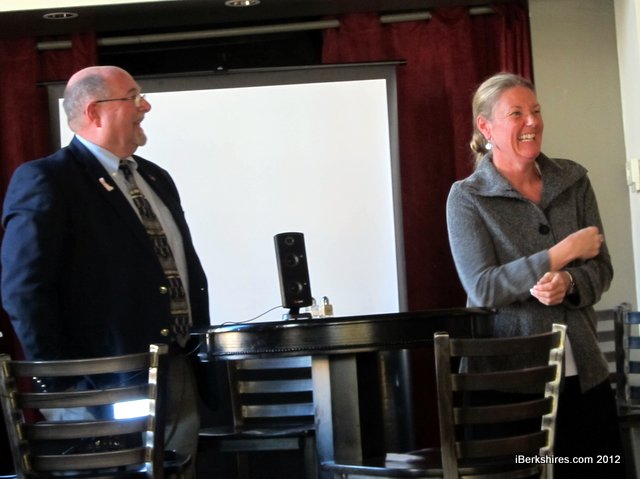BerkshireRides Marks Decade of Driving North Berkshire

|
||||
U.S. Rep. John W. Olver, who was critical to the early funding of the initiative, joined local officials and members and users of BerkshireRides on Monday afternoon at Public Eat and Drink to celebrate the organization's growth from transporting workers to becoming a national model for rural mobility management.
"I've been asked to speak to a lot of places all acrose the country about how we do things here," said Project Manager Jana Hunkler Brule. "Because we're working with our community, we're getting people to work and we're doing a lot of other things to help people live better, fuller lives through transportation."
Since its inception, the service has provided more than a half-million rides, almost exclusively in Northern Berkshire, touching upwards of 5,600 people, said Hunkler Brule, or 32 percent of the employable population. Since 2007, youth organizations and nonprofits have utilized its five-van fleet, racking up 97,000 miles.
"We bring them back and forth to bus stops," she said. "In the last five years, we've done 2,600 trips to bus stops. ... We provide what we call the first and last mile."
Mayor Richard Alcombright recalled how the program came together in 1999 when he attended a Northern Berkshire Community Coalition meeting on transportation that included NBCC Director Alan Bashevkin and Olver.
"I was very surprised what I learned at that meeting," said Alcombright, who described himself as naive about difficulties others had with transportation. "Enough so that I joined in with several others to begin discussions around the Transportation Association of Northern Berkshire, which would later to grow into BerkshireRides."
Olver said he remembered the "lengthy discussions we had and the main issue was that there were a fair number of people who could not get to jobs because they didn't live close to bus stops, or the schedule of the bus ... didn't meet their time needs."
He congratulated the board for its efforts in growing the program. "Thank you very, very much for helping make this happen."
The program's success has been in large part because of the partnerships its made with local organizations and the Berkshire Regional Transit Authority, Hunkler Brule said, including working to ensure transportation is accessible for the handicapped.
 |
|
| Above, NBCC's Alan Bashevkin, left, Paul Hopkins of NBH and Sharon Boyd of Arcadia Services; right, U.S. Rep. John W. Olver. | .jpg) |
U.S. Sen. Scott Brown, R-Wrentham, sent a letter commending the program for its work; in attendance were Gary Shepard of the BRTA and McCann Technical School Superintendent James Brosnan, along with former BerkshireRide board members.
The funding that once came from the federal government for the program is now flowing through the state Department of Transportation thanks to amendments pushed by state Sen. Benjamin B. Downing, D-Pittsfield, and Rep. Gailanne Cariddi, D-North Adams.
Both lauded the retiring Olver for his advocacy over the years and pledged to continue working to keep the program funded.
Downing said government spending often comes under attack, but funding important programs can impact people's lives.
"If Rep. Olver hadn't advocated for the funds to provide those hundreds of thousands of rides in the Berkshire ... who knows where we would be?" said Downing.
"It's important to remember that if we make the right investments in transportation, education, innovation that we can create jobs, we can grow and more important we can determine our own future."
Tags: Berkshire Regional Transportation Authority, BerkshireRides, transportation,















